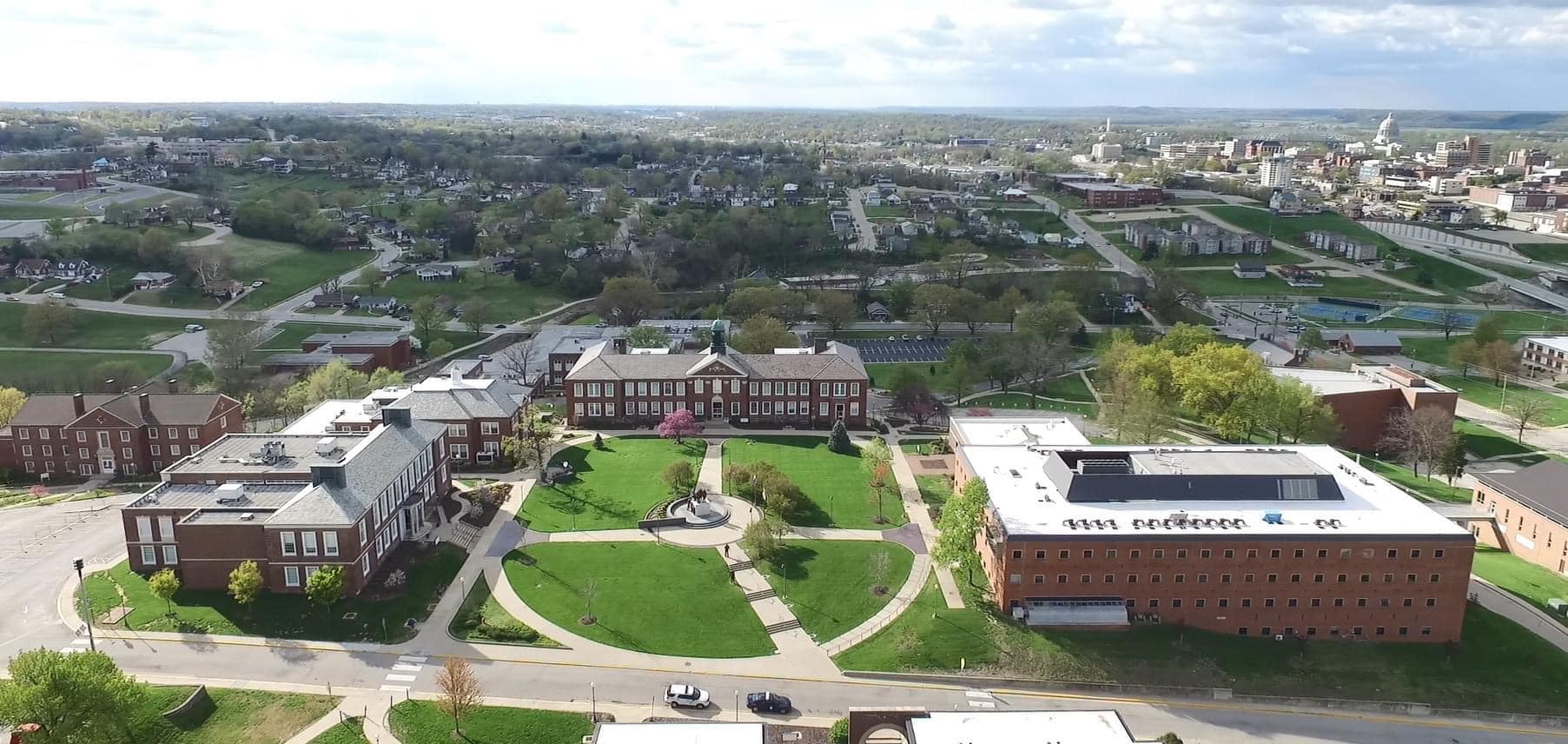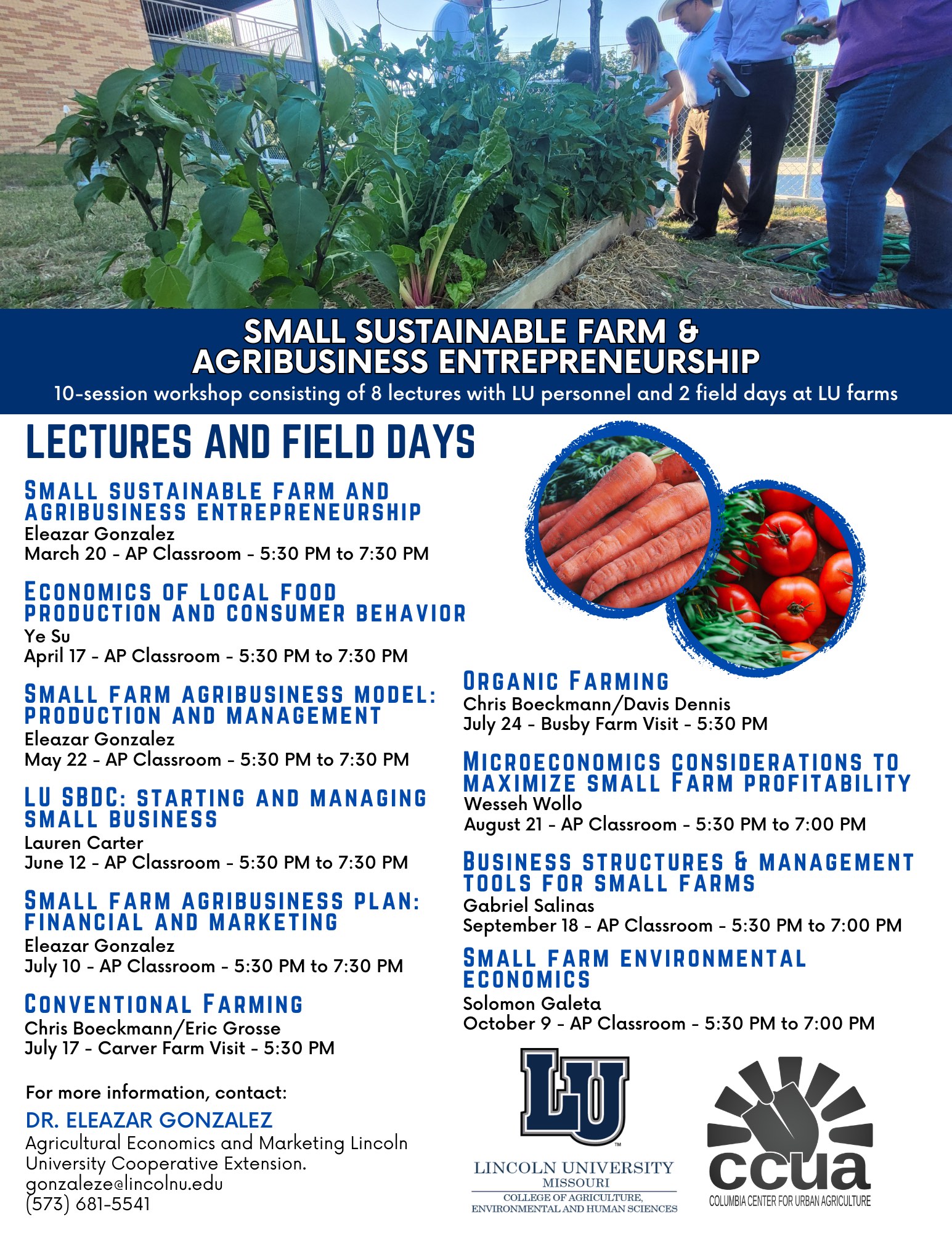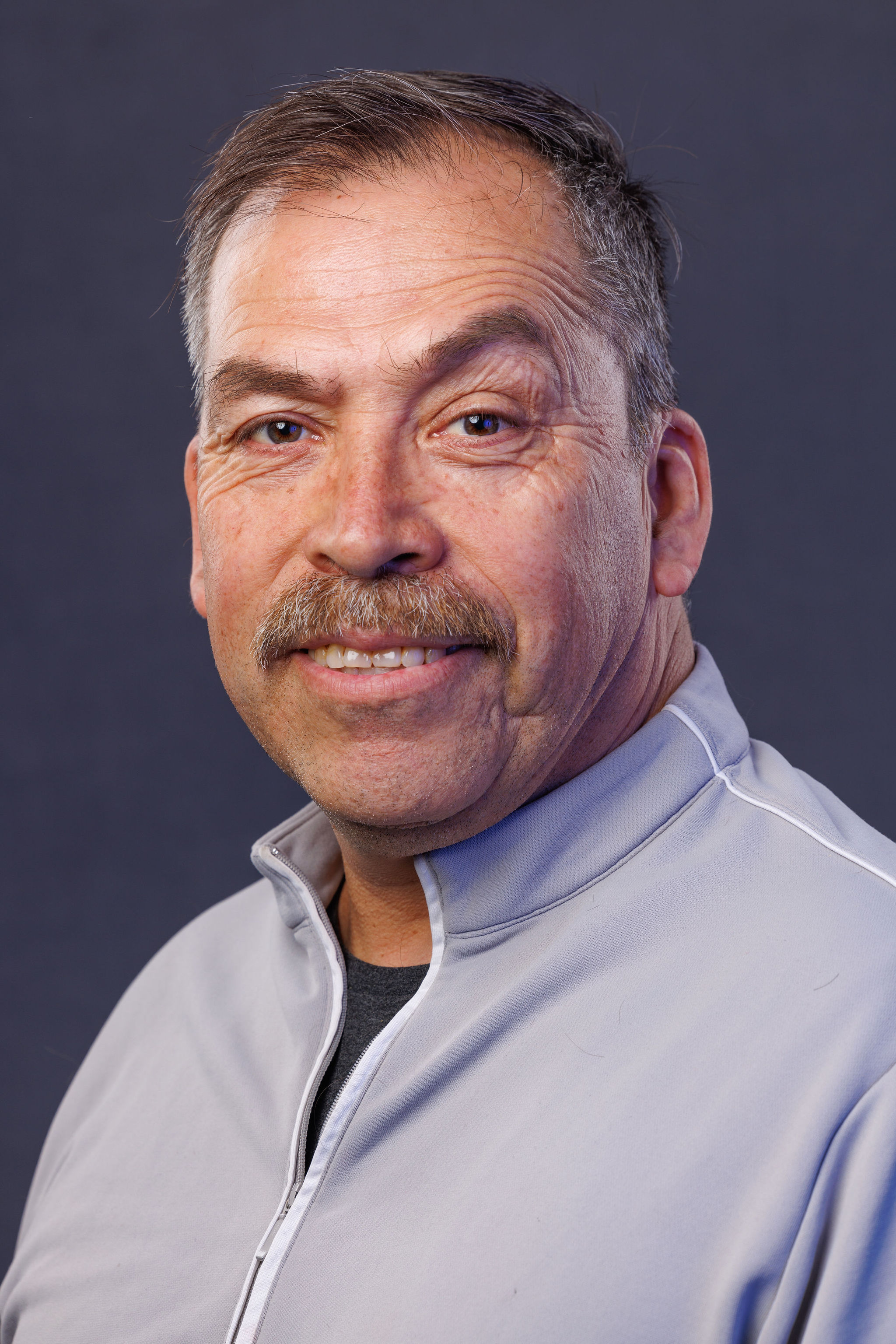Agricultural Economics and Marketing Program

The Agricultural Economics and Marketing Program (AEMP) covers issues that are pertinent to the agricultural and agribusiness clientele of Lincoln University.
AEMP serves both Extension and Research, is housed in Cooperative Extension offices in Allen Hall and serves constituents througout the state of Missouri and nationwide. We tackle issues that include the areas of economics, marketing, farm management and production.
Historically, the clientele has been made up of small, disadvantaged and limited-resource farmers and ranchers. These individuals are primarily concentrated in four sections of Missouri, namely, East Central, West Central, Southeast and Southwest.
Read the latest!
Learn more about the demand for small ruminants, market and consumer trends. Click the link below to receive market reports and information about future events and outreach opportunities via email.
Goal
The goal of the AEMP is to help small farm enterprises across Missouri to be sustainable economically, socially and ecologically.
This overarching goal is achieved by providing assistance to small farm families through one-on-one farm visits, workshops, research and demonstrations. Also, the program assists with farm and financial issues, cooperative and direct marketing, sustainable agricultural practices and other on-farm research as needed. To enhance the quality of the program and projects, we recognize the need to tap into the enormous niche advantages available to our clientele.
As economics and marketing issues are the concern of most, if not all, areas of our endeavors in Cooperative Extension, many services are provided by the AEMP to meet the various needs of our clientele. These include the following:
- niche marketing strategies.
- economics and marketing of Missouri goats, sheep and wool.
- record keeping, computer training and farm management.
- risk management education for farmers.
Community Involvement
Lost in translation: How USDA barriers leave immigrant farmers and ranchers behind
Farmers are still waiting for CBD product regulation 5 years after U.S. legalized hemp
A Discussion on Industrial Hemp
LU Extension Program Teaching People How to Garden
Diversity and Inclusion in Agriculture: The Case for Missouri Latino Farmers and Ranchers
ABC News: Small business and professors give perspective on rising fuel costs
Active Programs
This program seeks to enhance agribusiness entrepreneurship, sustainable practices, and organic farming and ranching amongst new and beginning Latino producers in Missouri and Nebraska by helping them to integrate business and production plans into a Community Capacity Agribusiness Plan to Operate (CCAP), regardless of size.
The program Entrepreneurial Sustainable Agriculture for Latinx and Limited Resource Producers in Missouri aims to expand those findings with an additional approach to evaluate current sustainable production methods among Latino producers. It will use a convenient sample of 50 Latino producers and document the current levels of skills, knowledge, and attitudes toward partially and fully transitioning into sustainable and organic production methods supported by a mixed- methods analysis. Findings from data will document educational needs of Latinx farmers. We will follow an entrepreneurial sustainable agriculture methodology to train Latino farmers in Missouri in sustainable agriculture production methods that aims to protect natural resources, increase farm profitability and socio-economic community development.
This program offers a hybrid educational training to help stakeholders to start their own small farming operations. It offers eight sessions in classroom training mixed with onsite gardening and farming activities at the site of training. It supports local community non-for-profit secular and non-secular organizations who help their members to connect with local grown food such as community gardens and small private operations.
2023 SMALL SUSTAINABLE FARM & AGRIBUSINESS ENTREPRENEURSHIP

The program is part of this Food and Agriculture organization initiative to develop guidelines to help stakeholders to understand circular bioeconomy approaches in livestock production systems.
Active Partnerships and Collaborations
- Project: Climate Change: Impacts for Socially Disadvantaged Farmers, Landowners & Communities of Color –
- Socioeconomic Research- Qualitative and quantitative approaches
North Central Region Water Network
- Project: North Central Region Extension Collaborations to Address Climate Impacts/Disparities Workshop
- Equity and inclusion in climate change
Hemp Institute - Lincoln University
- Project: "Scaling up the Industrial Hemp Supply Chain as a Negative Carbon Feedstock for Fuel and Fiber"
- Socioeconomic data analysis and hemp farmer forums.
Soil LU
- Project: “Developing and deploying novel soil health indicators for Missouri Specialty crops to advance resilient agriculture”
- Outreach and data collection
Columbia Center for Urban Agriculture
- Project: Urban Agriculture Apprenticeship Program
- Partnership with the Columbia Center for Urban Agriculture in the project:
- Delivering eight lectures on sustainable small farm agribusiness development and two farm visits to LU conventional and Organic Farm.
Agribusiness Research - Lincoln University
- Project: Resilient and Sustainable Small Farms: Lessons from the COVID-19 Pandemic.
- Outreach and data collection
Specialty Crops Lincoln University
- Project: Urban Agriculture Learning Hub at Lincoln University
- Consulting and Training
Small Ruminants- Lincoln University
- Project: “Pasture and livestock risk management education for Missouri small ruminant unrepresented and underserved farmers.”
- Consulting and training
Missouri Department of Elementary and Secondary Education
- Project: Local Food for Schools (LFS) Program
- Outreach to underserved local farmers and ranchers to connect with school as a new market outlet
YouTube Video Resources
Session 1. Missouri Hemp Industry- Farmer Challenges and Perspectives
Session 2. Missouri Industrial Hemp Program Overview
Session 3.Experience in Hemp Regenerative Agriculture
Session 4. Hemp for Fiber. A farmer perspective
Session 5. LU Hemp Institute Update
Session 6. Hemp Farmer Panel
Agriculture support programs:
Session 1. Finding Your Gardening Spot
Session 2. Soil Management
Session 3. Garden Design
Session 4. Specialty Crops, Pollinators and Seed Management
Session 5. Managing The Garden Bed
Session 6. Natural and Integrated Pest Control Management
Session 7. Harvesting
Session 8. Post-Harvest Management
Session 9. Markets, Marketing and Regulations To Sell
Publications
- Production Trends and Perspectives of Industrial Hemp in Missouri and the United States
- Garden Entrepreneurship and Covid-19 - FS2021
- Financial Resources for Farmers and Ranchers - Coronavirus Aid, Relief and Economic Security (CARES) Act 2020
- Update to the Proceedings of The Second Missouri Goat Producers' Marketing Conference
- Exploring Efficiencies in the Merger of the New Generation Growth Cooperative and Farmers' Market to Enhance Vibrant Rural Economies and National Food Security
- Economics and Marketing of Lamb and Wool: The Case of Missouri (2012)
- Economics and Marketing of Goats: The Case of Missouri (2009)
- Marketing Strategies for Small Farms: Missouri Goats First on Internet Auction
Contact Info:

State Extension Specialist-Small Sustainable Farm, Ag. Economics and Marketing
107 Allen Hall
P: (573) 681-5541
E: GonzalezE@LincolnU.edu


